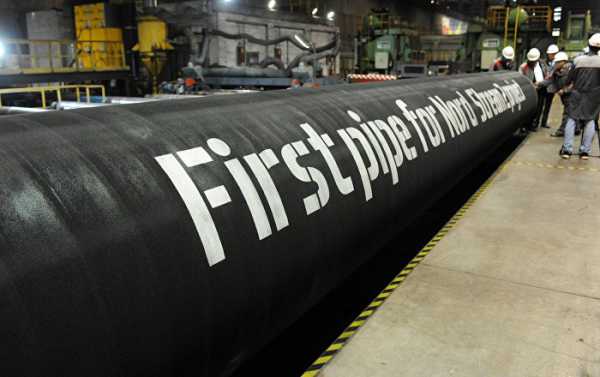
On top of that, Andrea Nahles has called for “intensive dialogue” with Russia, who she said remains “an important partner” for Germany and Europe, especially when it comes to trade relations. Her remarks come ahead of Saturday’s meeting between Russian President Vladimir Putin and German Chancellor Angela Merkel in Berlin.
Speaking to the Funke media group, Andrea Nahles, leader of Germany’s Social Democratic party (SPD), underscored that Berlin will not scrap energy policy agreements because of the US position on the Nord Stream 2 project.
“This gas pipeline [Nord Stream 2] is being built by a European consortium so we cannot afford us being discouraged from our energy policy deals just because the US president cannot accept it,” Nahles said.
She recalled that Germany gets energy supplies from many countries, and that “another gas pipeline will not make us dependent on Russia.”
In an interview with Fox News in mid-June, Trump admitted that Germany has the right to participate in the Nord Stream 2 project, but that doing so will be a tricky task for Germany, given its membership in NATO.
The remarks came shortly after Trump’s joint press conference with Russian President Vladimir Putin, following their high-level talks in Helsinki, during which Trump said that the US is “going to be selling LNG [liquefied natural gas] and will have to be competing with the [Nord Stream 2] pipeline and I think we’ll compete successfully.”
Trump earlier remarked that “Germany will have almost 70% of their country controlled by Russia with natural gas” and that Nord Stream 2 “should never have been allowed to happen.”
The Trump administration has repeatedly attacked the Nord Stream 2 endeavor, even threatening to impose sanctions on an array of European energy giants involved in the project. According to Washington, Nord Stream 2 violates the energy security of the EU and also undermines the interests of Ukraine.
Russia has, in turn, more than once urged its European partners not to perceive the Nord Stream 2 pipeline as an instrument of influence. President Vladimir Putin has stressed that Moscow considers the project to be entirely economic in nature.
Germany, Sweden and Finland have already given permission for the pipeline’s construction in their territorial waters. The only country on the fence about the project is Denmark.
Nord Stream 2 is a joint venture between Russia’s Gazprom and France’s Engie, Austria’s OMV AG, UK-Dutch Royal Dutch Shell, as well as Germany’s Uniper and Wintershall. The pipeline, due to be put into operation in 2019, aims to annually deliver 55 billion cubic meters of Russian natural gas across the Baltic Sea to Germany.
Putin, Merkel Due to Agree on WTO Rules
Nahles also stressed that a lot of global conflicts cannot be resolved without Russia’s participation and that Germany needs “an intensive dialogue” with Moscow.
The SPD member also highlighted the particular importance of cooperation in enforcing WTO rules now that US President Donald Trump had “imposed sanctions on “half of the world” which she said seriously affects western Asia.
“We should again achieve greater legal certainty in trade relations, and here Russia can act as an important partner for dialogue between Germany and Europe. I hope that during the upcoming Merkel-Putin meeting, a deal on strengthening the provision of WTO rules will be clinched,” Nahles added.
Earlier in August, Trump and EU Commission President Jean-Claude Juncker reached several agreements to prevent the nascent trade dispute between Washington and Brussels.
The two parties, in particular, agreed to work toward the elimination of all customs tariffs and non-tariff barriers in trade and to strengthen strategic energy cooperation, envisaging an increase in the supply of US liquefied natural gas to Europe. Trump and Juncker also agreed to work to reform the World Trade Organization.
EU-US trade relations have been tense since Trump’s decision to impose tariffs on steel and aluminum imports. The European Union had initially sought to be exempted from the trade restrictions, but, when Washington refused to issue a waiver, introduced its own duties on US goods.
Sourse: sputniknews.com






